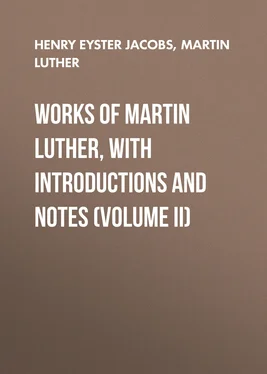Henry Eyster Jacobs - Works of Martin Luther, with Introductions and Notes (Volume II)
Здесь есть возможность читать онлайн «Henry Eyster Jacobs - Works of Martin Luther, with Introductions and Notes (Volume II)» — ознакомительный отрывок электронной книги совершенно бесплатно, а после прочтения отрывка купить полную версию. В некоторых случаях можно слушать аудио, скачать через торрент в формате fb2 и присутствует краткое содержание. Жанр: foreign_prose, foreign_religion, Философия, foreign_psychology, foreign_antique, на немецком языке. Описание произведения, (предисловие) а так же отзывы посетителей доступны на портале библиотеки ЛибКат.
- Название:Works of Martin Luther, with Introductions and Notes (Volume II)
- Автор:
- Жанр:
- Год:неизвестен
- ISBN:нет данных
- Рейтинг книги:3 / 5. Голосов: 1
-
Избранное:Добавить в избранное
- Отзывы:
-
Ваша оценка:
- 60
- 1
- 2
- 3
- 4
- 5
Works of Martin Luther, with Introductions and Notes (Volume II): краткое содержание, описание и аннотация
Предлагаем к чтению аннотацию, описание, краткое содержание или предисловие (зависит от того, что написал сам автор книги «Works of Martin Luther, with Introductions and Notes (Volume II)»). Если вы не нашли необходимую информацию о книге — напишите в комментариях, мы постараемся отыскать её.
Works of Martin Luther, with Introductions and Notes (Volume II) — читать онлайн ознакомительный отрывок
Ниже представлен текст книги, разбитый по страницам. Система сохранения места последней прочитанной страницы, позволяет с удобством читать онлайн бесплатно книгу «Works of Martin Luther, with Introductions and Notes (Volume II)», без необходимости каждый раз заново искать на чём Вы остановились. Поставьте закладку, и сможете в любой момент перейти на страницу, на которой закончили чтение.
Интервал:
Закладка:
[Sidenote: The Pallium]
Since even these practices were not enough, and Avarice grew impatient at the long time it took to get hold of all the bishoprics, therefore my Lord Avarice devised the fiction that the bishoprics should be nominally abroad, but that their land and soil should be at Rome, and no bishop can be confirmed unless with a great sum of money he buy the pallium 161 161 The pallium is a woolen shoulder-cape which is the emblem of the archbishop's office, and which must be secured from Rome. The bestowal of the pallium by the pope is a very ancient custom. Gregory I (590-604) mentions it as prisca consuetudo ( Dist. , C.c. 3). The canon law prescribes ( Dist. C. c. I ) that the archbishop-elect must secure the pallium from Rome within three months of his election; otherwise he is forbidden to discharge any of the duties of his office. It is regarded as the necessary complement of his election and consecration, conferring the "plenitude of the pontifical office," and the name of archbishop. Luther's charge that it had to be purchased "with a great sum of money" is substantiated by similar complaints from the XII Century on, though the language of the canon law makes it evident that Luther's other contention is also correct, viz., that the pallium was originally bestowed gratis. The sum required from the different archbishops varied with the wealth of their sees, and was a fixed sum in each case. The Gravamina of 1521 complain that the price has been raised: "Although according to ancient ordinance the bishoprics of Mainz, Cologne, Salzburg, etc., were bound to pay or the pallium about 10,000 gulden and no more, they can now scarcely get a pallium from Rome for 20 or 24 thousand gulden." (Wrede, op. cit. , II, 675.)
, and bind himself with terrible oaths to be the pope's servant 162 162 The oath of allegiance to the pope was required before the pallium could be bestowed ( Dist. C, c. I). The canon law describes this oath as one "of allegiance, obedience and unity" (X, I, 6, c. 4).
. This is the reason that no bishop ventures to act against the pope. That, too, is what the Romans were seeking when they imposed the oath, and thus the very richest bishoprics have fallen into debt and ruin. Mainz pays, as I hear, 20,000 gulden. These be your Romans! To be sure they decreed of old in the canon law that the pallium should be bestowed gratis, the number of papal servants diminished, the contests lessened, the chapters 163 163 See above, p. 86, note 2.
and bishops allowed their liberty. But this did not bring in money, and so they turned over a new leaf, and all authority was taken from the bishops and chapters; they are made ciphers, and have no office nor authority nor work, but everything is ruled by the archknaves at Rome; soon they will have in hand even the office of sexton and bell-ringer in all the churches. All contests are brought to Rome, and by authority of the pope everyone does as he likes.
What happened this very year? The Bishop of Strassburg 164 164 cf. Luther to Spalatin, June 25, 1520 (Enders, II, 424; Smith, No. 271).
wished to govern his chapter properly and to institute reforms in worship, and with this end in view made certain godly and Christian regulations. But my dear Lord Pope and the Holy Roman See, at the instigation of the priests, overthrew and altogether condemned this holy and spiritual ordinance. This is called "feeding the sheep of Christ!" [John 20:15-17] Thus priests are to be encouraged against their own bishop, and their disobedience to divine law is to be protected! Antichrist himself, I hope, will not dare to put God to such open shame! There you have your pope after your own heart! Why did he do this? Ah! if one church were reformed, it would be a dangerous departure; Rome's turn too might come! Therefore it were better that no priest should be let at peace with another, that kings and princes should be set at odds, as has been the custom heretofore, and the world filled with the blood of Christians, only so the concord of Christians should not trouble the Holy Roman See with a reformation.
So far we have been getting an idea of how they deal with livings which become vacant. But for tender-hearted Avarice the vacancies are too few, and so he brings his foresight to bear upon the benefices which are still occupied by their incumbents, so that they must be unfilled, even though they are not unfilled 165 165 i. e., The benefices are treated as though they were vacant.
. And this he does in many ways, as follows:
[Sidenote: Coadjutorships]
First , He lies in wait for fat prebends or bishoprics which are held by an old or a sick man, or by one with an alleged disability. To such an incumbent, without his desire or consent, the Holy See gives a coadjutor, i. e., an "assistant," or the coadjutor's benefit, because he is a "papal servant," or has paid for the position, or has earned it by some other ignoble service to Rome. In this case the rights of the chapter or the rights of him who has the bestowal of the living 166 166 In the case of certain endowed benefices the right to nominate the incumbent was vested in individuals, usually of the nobility, and was hereditary in their family, This is the so-called jus patronum , or "right of patronage." The complaint that this right is disregarded is frequent in the Gravamina of 1521.
must be surrendered, and the whole thing all into the hands of Rome.
[Sidenote: Commendations]
Second , There is a little word commend 167 167 Commendation was one of the practices by which the pope evaded the provision of the canon law which prescribed that the same man should not hold two livings with the cure of souls. The man who received an office in commendam was not required to fulfil the duties attached to the position and when a living or an abbacy was granted in this way during the incumbency of another, the recipient received its entire income during a subsequent vacancy. The practice was most common in the case of abbacies. At the Diet of Worms (1521), Duke George of Saxony, an outspoken opponent of Luther, was as emphatic in his protest against this practice as Luther himself (Wrede, op. cit. , II, 665); his protest was incorporated in the Gravamina ( ibid. , 672), and reappears in the Appendix ( ibid. , 708).
, by which the pope entrusts the keeping of a rich, fat monastery or church to a cardinal or to another of his people, just as though I were to give you a hundred gulden to keep. This is not called the giving or bestowing of the monastery nor even its destruction, or the abolition of the worship of God, but only "giving it into keeping"; not that he to whom it is entrusted is to care or it, or build it up, but he is to drive out the incumbent, to receive the goods and revenues, and to install some apostate, renegade monk 168 168 A monk who deserted his monastery was known as an "apostate."
, who accepts five or six gulden a year and sits in the church all day selling pictures and images to the pilgrims, so that henceforth neither prayers nor masses are said there. If this were to be called destroying monasteries and abolishing the worship of God, then the pope would have to be called a destroyer of Christendom and an abolisher of God's worship, because this is his constant practice. That would be a hard saying at Rome, and so we must call it a commend or a "command to take charge" of the monastery. The pope can every year make commends out of our or more of these monasteries, a single one of which may have an income of more than six thousand gulden. This is the way the Romans increase the worship of God and preserve the monasteries. The Germans also are beginning to find it out.
[Sidenote: Incorporation]
[Sidenote: Union]
Читать дальшеИнтервал:
Закладка:
Похожие книги на «Works of Martin Luther, with Introductions and Notes (Volume II)»
Представляем Вашему вниманию похожие книги на «Works of Martin Luther, with Introductions and Notes (Volume II)» списком для выбора. Мы отобрали схожую по названию и смыслу литературу в надежде предоставить читателям больше вариантов отыскать новые, интересные, ещё непрочитанные произведения.
Обсуждение, отзывы о книге «Works of Martin Luther, with Introductions and Notes (Volume II)» и просто собственные мнения читателей. Оставьте ваши комментарии, напишите, что Вы думаете о произведении, его смысле или главных героях. Укажите что конкретно понравилось, а что нет, и почему Вы так считаете.












